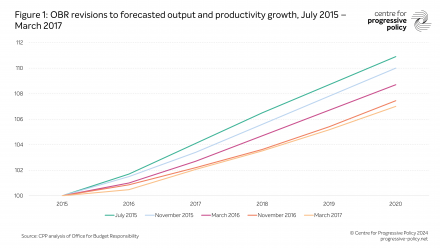
Last week’s King’s Speech kicked off this parliament with a crammed legislative agenda. Within the mammoth 40 bills were many preannounced polices from the election campaign, framed as part of Labour’s drive to deliver its central mission: growth.
There can be little doubting the seriousness with which Labour is setting out its stall on this agenda – with sweeping planning reforms, the National Wealth Fund and other industrial policy measures set to do the heavy lifting. But what if, for all the best will in the world, pre-financial crisis growth rates are simply no longer possible?
Productivity growth has stalled not just in the UK but in the vast majority of OECD countries. For many years after 2009 we have had the annual humiliation of forecasters revising down their expectations for growth.
We need to be realistic: growth of between 1-1.5% per annum may be close to the ceiling of what the UK economy can achieve, at least in the medium term. The post-war trend of 2.5% growth is long dead.
Going for growth
In such a world the important political and economic question is not how to shift GDP growth from 1.1-1.2%, but how that 1% growth is distributed.
Against the backdrop of long-term economic stagnation, it’s no secret that the popularity for extreme political parties is growing. France, Italy, Hungary and Spain have seen surges in support for far-right parties over the last decade. And in the US, despite growth rates that are higher than European peers, the MAGA movement – ultranationalist populism masquerading as the Republican Party – is currently on course to take over the White House.
An isolationist USA will have dramatic consequences for the global economy. In the UK, it is no coincidence that Reform did best in areas of higher deprivation and that voted to leave the EU.
READ MORE: Reeves drops hint towards public sector pay increase above inflation
Pivoting economic policy to focus on the distribution of growth and not the quantum will require a very different approach. It will require a laser-focused industrial strategy which is as focused on place as it is on sector. It will need to relentlessly seek to crowd in private investment into poorer parts of the country, to focus on towns not just cities and to focus on good work for all in those places, not just developing nascent but potentially highly productive sectors.
The successes and limitations of Bidenomics as an economic and political tool are instructive here about the scale of the challenge and the urgency to get serious on distribution – who benefits, not just what happens – and stick with it. The Biden administration delivered multiple large- and small-scale place-based programmes to drive high value add sectors, clean energy investment and other fiscal transfers.
Lessons from Bidenomics

The good news is that job growth in the most ‘left-behind’ areas in the US increased since 2019, reversing the long run trend of job destruction in these areas. The bad news is that this job growth is only modest.
A recent Brookings Institute paper concluded that to close huge spatial inequalities in the US, a focus on job creation beyond manufacturing and high-tech sectors is needed. Only then will enough people feel the difference.
Starmer’s Labour party has kicked off this parliament in positive fashion. The drive for growth has begun, and the new government is bullish on ensuring that there is growth everywhere.
READ MORE: Sign up to our must-read daily briefing email on all things Labour
But suppose that isn’t possible in this era of stagnation. Given low trend growth, tight fiscal constraints and a short parliamentary window, the government will need to carefully choose where it targets its interventions.
Unless it doubles down on the distribution as much as the quantum of growth, the country is unlikely to feel the “change” it so badly needs.
In a world increasingly ready to embrace leaders and ideology thought unthinkable 20 years ago, Labour must show it is a serious progressive government that can make a difference to the lives of those who need it most.
SHARE: If you have anything to share that we should be looking into or publishing about this story – or any other topic involving Labour or the election – contact us (strictly anonymously if you wish) at [email protected].
SUBSCRIBE: Sign up to LabourList’s morning email here for the best briefing on everything Labour, every weekday morning.
DONATE: If you value our work, please donate to become one of our supporters here and help sustain and expand our coverage.
PARTNER: If you or your organisation might be interested in partnering with us on sponsored events or content, email [email protected].




More from LabourList
‘Tackling poverty should be the legacy of Keir Starmer’s government’
‘The High Court judgment brings more uncertainty for the trans community’
‘There are good and bad businesses. Labour needs to be able to explain the difference’